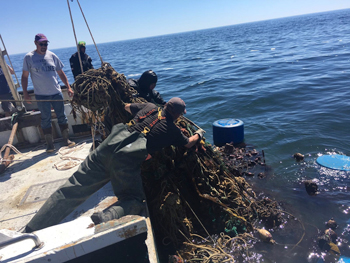5,000-pound “Ghost Gear” Mess
Removed From Ocean Floor
by Fishermen’s Voice Staff

Lobstermen grapple up a massive mess of ghost gear from the sea floor off Portland. Courtesy of Ocean Conservancy.
PORTLAND—On June 7, Portland fishermen and environmental groups departed the dock at Portland Fish Exchange to retrieve a 5,000-pound ball of ghost gear—lost and abandoned fishing gear—that had accumulated on the ocean floor.
Washington, D.C. environmental advocacy group Ocean Conservancy partnered with the Gulf of Maine Lobster Foundation, of Kennebunk, to retrieve the derelict gear.
The project was part of the Global Ghost Gear Initiative, a cross stakeholder alliance of fishing industry, private sector, corporations, NGOs, academia and governments focused on solving the problem of lost and abandoned fishing gear worldwide, according to the initiative’s website.
Ghost gear refers to fishing gear that has been abandoned, lost or otherwise discarded. Reasons why fishing gear can be lost or abandoned include severe weather, snags beneath the surface, conflict with other gear, interaction with other vessels and, rarely, intentional discard when no other options are available. The initiative was launched in 2015.
The project was funded by Newport, R.I.’s, 11th Hour Racing, which establishes strategic partnerships within the sailing and maritime communities to promote collaborative, systemic change benefitting the health of the ocean.
“Lost or abandoned fishing gear is the deadliest form of marine debris because it is specifically designed to trap and kill,” Nicholas Mallos, director of Ocean Conservancy’s Trash Free Seas program, said in the release. “And because the majority of fishing gear is made of plastic and other synthetic materials, once lost it lingers in the environment and continues to indiscriminately capture fish and other marine wildlife for years to come. This ‘ghost fishing’ impacts marine habitats and the fishers and coastal economies that depend on a healthy ocean.”
“Fishermen make a living
on the water and are
stewards at heart.”
– Erin Pelletier,
Gulf of Maine Lobster
Foundation
Gulf of Maine Lobster Foundation Executive Director Erin Pelletier said, “Fishermen make a living on the water and are stewards at heart. While lost gear is an unfortunate reality of providing fresh seafood, fishermen are eager to find solutions and want to do what they can to help recover lost gear.”
Scientists estimate that approximately 8 million metric tons of plastic enters the ocean from land every year, according to the release. The amount of fishing gear is unknown, although it’s estimated there’s more than 800,000 tons of ghost gear.
Launched in 2015, the Global Ghost Gear Initiative is the first global collective impact alliance dedicated to tackling the problem of ghost fishing gear at a global scale.
The initiative conducted a similar project in the Gulf of Maine in October 2018, according to the website. The gear removal occured in an area where heavy lobster fishing occurs. Local fishermen dove in an area where they are aware of a large mass of gear having been lost and unable to be recovered with standard grappling, according to a press release. Vessels were hired in Casco Bay to dive on the ball of gear and use a dragger with a winch to assist in getting the gear on board. The recovered gear was brought to a wharf in Portland for sorting and processing. The gear was primarily nets and rope and after cutting the debris into small sections it was taken to EcoMaine, a waste-to-energy facility. The container used to haul the gear was donated by the National Oceanic and Atmospheric Administratin’s Marine Debris Program.
The initiative conducted similar recoveries in places like Myanmar, Panama, and California.
Locating and recovering lost fishing gear can save thousands of dollars for local fishermen, prevent gear conflict, prevent the entrapment of local stocks, and protect the marine habitat, according to the release In the past, the Gulf of Maine Lobster Foundation has run similar recovery projects by grappling for lost traps and assorted gear. During those recovery efforts, data about by-catch, escape vent functionality, and age of trap are recorded for each trap.
Ocean Conservancy assumed leadership of the Global Ghost Gear Initiative in 2019.
